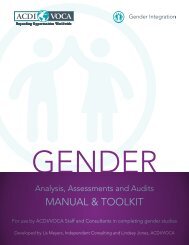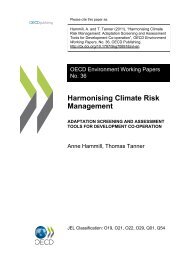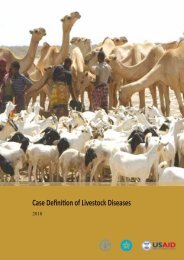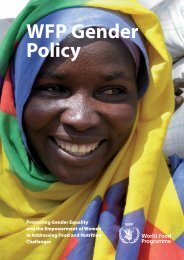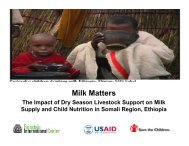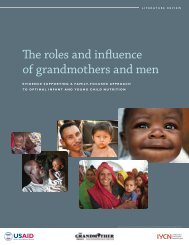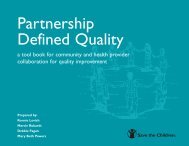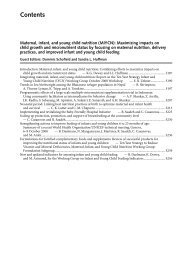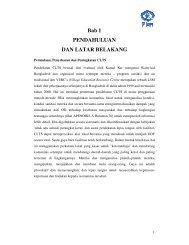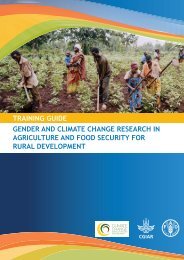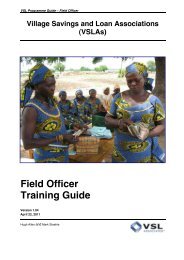Module 2. Theorethical Concepts of Gender - FSN Network Portal
Module 2. Theorethical Concepts of Gender - FSN Network Portal
Module 2. Theorethical Concepts of Gender - FSN Network Portal
You also want an ePaper? Increase the reach of your titles
YUMPU automatically turns print PDFs into web optimized ePapers that Google loves.
Mainstreaming <strong>Gender</strong> into Water, Sanitation and Hygiene (WASH) Programs<br />
<strong>Module</strong> 2: Theoretical <strong>Concepts</strong> <strong>of</strong> <strong>Gender</strong><br />
Lesson 8: Social Vulnerability and WASH<br />
chores and environmental hazards, such as contact with polluted water,<br />
agricultural pesticide and indoor air pollution, all have a cumulative negative<br />
impact on the health <strong>of</strong> women in many developing countries. Where women<br />
are not able to walk long distances many times in one day, it is unlikely that<br />
they will be able to access as much water as is recommended for adequate<br />
hygiene and sanitation. As described in the section on poverty and water,<br />
reduced water use has serious consequences on the health <strong>of</strong> the entire<br />
family.<br />
It has been argued that collecting water <strong>of</strong>fers women a social activity,<br />
keeping them in touch with each other. However, if women did not have to<br />
spend time fetching water, the time that they saved could be spent more<br />
pr<strong>of</strong>itably, e.g. in organising self-help enterprises together and gaining from a<br />
political voice to press for improved services.<br />
If women’s needs in water collection are not recognised through water<br />
management systems, it is likely that women will be unable to access as<br />
much water as is recommended for effective hygiene and sanitation. Again,<br />
this reduced water use can have serious consequences on family health.<br />
A failure to take gender concerns into account when designing water systems<br />
can be detrimental to women in terms <strong>of</strong> education, health and safety. Yet<br />
women are not the only victims <strong>of</strong> gender-blind water management systems.<br />
With the greater ‘feminization <strong>of</strong> agriculture’, women have become the<br />
tenderers <strong>of</strong> most rural families’ agricultural plots. It is estimated that women<br />
are responsible for half <strong>of</strong> the world’s food production (FAO, 2002).<br />
Given the heavy reliance on women for food security, women’s access to<br />
water and irrigation systems is critical in meeting basic family needs.<br />
However, women farmers <strong>of</strong>ten have very little or no access to water for<br />
agricultural purposes and are entirely dependent on rainfall. This problem is<br />
compounded by the fact that traditionally, women’s access to land ownership,<br />
and thus access to water supply, has been limited by the discriminatory legal<br />
rights and customs <strong>of</strong> many countries.<br />
Commonly, women’s informal sector activities are extensions <strong>of</strong> their<br />
domestic roles, and they <strong>of</strong>ten operate directly from their homes, sometimes<br />
relying on assistance from their children. Most <strong>of</strong> these businesses require a<br />
low initial capital outlay, but access to water is <strong>of</strong>ten essential for production<br />
and sanitation. There has been little analysis <strong>of</strong> the importance <strong>of</strong> access to<br />
water in women’s choice <strong>of</strong> particular informal-sector business activities, in<br />
the success and failure <strong>of</strong> their business, or in the capacity to expand their<br />
business activities.<br />
A Training Manual for Water Pr<strong>of</strong>essionals developed collaboratively by PROTOS and SNV, 01/02/2007<br />
<strong>2.</strong>52



